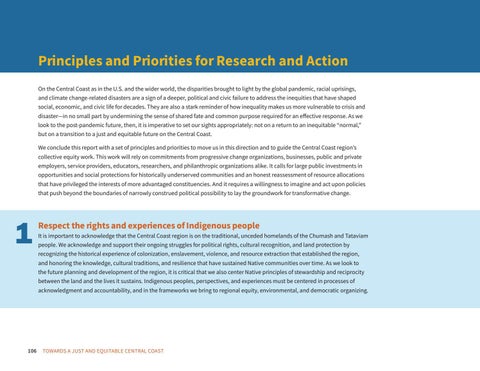Principles and Priorities for Research and Action On the Central Coast as in the U.S. and the wider world, the disparities brought to light by the global pandemic, racial uprisings, and climate change-related disasters are a sign of a deeper, political and civic failure to address the inequities that have shaped social, economic, and civic life for decades. They are also a stark reminder of how inequality makes us more vulnerable to crisis and disaster—in no small part by undermining the sense of shared fate and common purpose required for an effective response. As we look to the post-pandemic future, then, it is imperative to set our sights appropriately: not on a return to an inequitable “normal,” but on a transition to a just and equitable future on the Central Coast. We conclude this report with a set of principles and priorities to move us in this direction and to guide the Central Coast region’s collective equity work. This work will rely on commitments from progressive change organizations, businesses, public and private employers, service providers, educators, researchers, and philanthropic organizations alike. It calls for large public investments in opportunities and social protections for historically underserved communities and an honest reassessment of resource allocations that have privileged the interests of more advantaged constituencies. And it requires a willingness to imagine and act upon policies that push beyond the boundaries of narrowly construed political possibility to lay the groundwork for transformative change.
1
106
Respect the rights and experiences of Indigenous people It is important to acknowledge that the Central Coast region is on the traditional, unceded homelands of the Chumash and Tataviam people. We acknowledge and support their ongoing struggles for political rights, cultural recognition, and land protection by recognizing the historical experience of colonization, enslavement, violence, and resource extraction that established the region, and honoring the knowledge, cultural traditions, and resilience that have sustained Native communities over time. As we look to the future planning and development of the region, it is critical that we also center Native principles of stewardship and reciprocity between the land and the lives it sustains. Indigenous peoples, perspectives, and experiences must be centered in processes of acknowledgment and accountability, and in the frameworks we bring to regional equity, environmental, and democratic organizing.
TOWARDS A JUST AND EQUITABLE CENTRAL COAST
